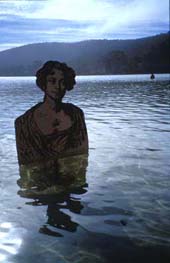|
2003
SEMINAR SERIES CONTESTED HISTORIES,
CONTESTED SITES Thursday 13th - 14th February 2003
1.00 - 2.10 Session 1 - Identity/identification 2.20 -3.30 Session 2 - History-Place 3.30 - 4.00 Afternoon tea 4.00 - 5.10 Session 3 - Convict Complications:
Survival and Cruelty 5.15 - 6.00 - ARC Linkages 12.30 - 1.15 Lunch 1.15 - 2.30 - Community Connections: 2.30 - 3.15 - A sense of Place 3.15 - 3.45 Afternoon tea and depart For further information contact Cassandra Pybus
SEMINAR SERIES 2002 The first seminar for 2002, the Language and Landscape seminar, was held at the Grange at Campbelltown on Friday 22 February. For further information, please contact the seminar convenor, Dr Cassandra Pybus . See the programme for details of the day.
The third seminar for
2002, History
from things, was Hosted
by the School of Visual & Performing Arts, University
of Tasmania in association with the Queen
Victoria Museum and Art Gallery. For further information
contact Deborah Malor. SEMINAR SERIES 2001 The second research seminar for 2001, Hybridity and Diaspora, was held on Friday 27th July at the Hobart Campus of the University of Tasmania. For more information please contact Anna Johnston, English and European Languages and Literatures, University of Tasmania. See programme and other details about the day. The first research seminar for 2001 was held on Friday 16 February at the early colonial homestead of Somercotes, near Ross, in the midlands of Tasmania. For more information please contact Anna Johnston, English and European Languages and Literatures, University of Tasmania. See programme and other details about the day. Somercotes was settled in 1823 by Captain Samuel Horton and is one of a select number of Australian properties that has remained in continual family ownership. Apart from the significant buildings and other artefacts remaining, it is the site of rich personal and cultural history. As well as the Georgian homestead, the cottages built for the indentured labourers have been preserved and are now available as 4 star colonial accommodation, while the original ticket-of-leave quarters have been restored to serve as a small conference centre where the seminar will be held.
 The
homestead was built with every possible protection against the danger
of attack by Aboriginals or bushrangers. All windows were fitted
with a internal and external cedar shutters, the doors and windows
were barred, while the courtyard was secured by a high sandstone
wall topped with an iron palisade. Nevertheless, in 1843, Somercotes
was attacked by the famous outlaw, Martin Cash, and two fellow bushrangers.
In the affray a shot was fired that lodged in the architrave of
the front door where it can be seen today. A contemporary account
of the attack, written by an American convict, Samuel Snow, who
was working on a neighbouring property, can
be read on the International Centre for Convict Studies site. The
homestead was built with every possible protection against the danger
of attack by Aboriginals or bushrangers. All windows were fitted
with a internal and external cedar shutters, the doors and windows
were barred, while the courtyard was secured by a high sandstone
wall topped with an iron palisade. Nevertheless, in 1843, Somercotes
was attacked by the famous outlaw, Martin Cash, and two fellow bushrangers.
In the affray a shot was fired that lodged in the architrave of
the front door where it can be seen today. A contemporary account
of the attack, written by an American convict, Samuel Snow, who
was working on a neighbouring property, can
be read on the International Centre for Convict Studies site.
'tense
past' an exhibition of art work by Julie Gough was held
at the Plimsoll Gallery, School of Art, University of Tasmania,
Hobart, in February 2001. This site also hosts an online exhibition
of Julie's work, Artworks and Stories.
Julie also made two midlands highway works for the "10
Days on the Island Festival" which was held from 28 March
- 8th April. These works are about the past seeping into the present,
and about how we view things like ice, water, air, fire as commodities
today. For more information see the Festival
site. Julie is a researcher at Colonialism and its aftermath, an artist and a postgraduate student of the School of Arts, University of Tamania. She also works as an Interpretation Officer (Aboriginal Culture) for the Parks and Wildlife Service, Hobart. The exhibition will be part of Julie's PhD submission. Follow this link to see more of Julie's art works. (The work at the right of this page is taken from The whispering sands (Ebb Tide), 1998 series.) |
